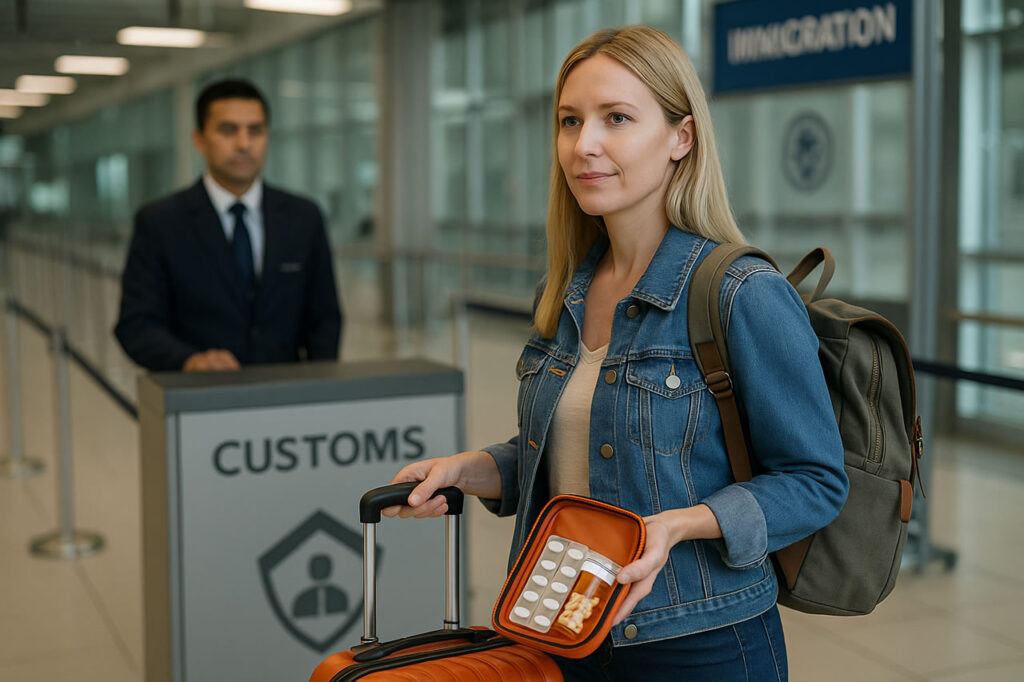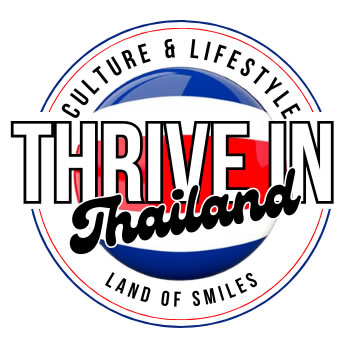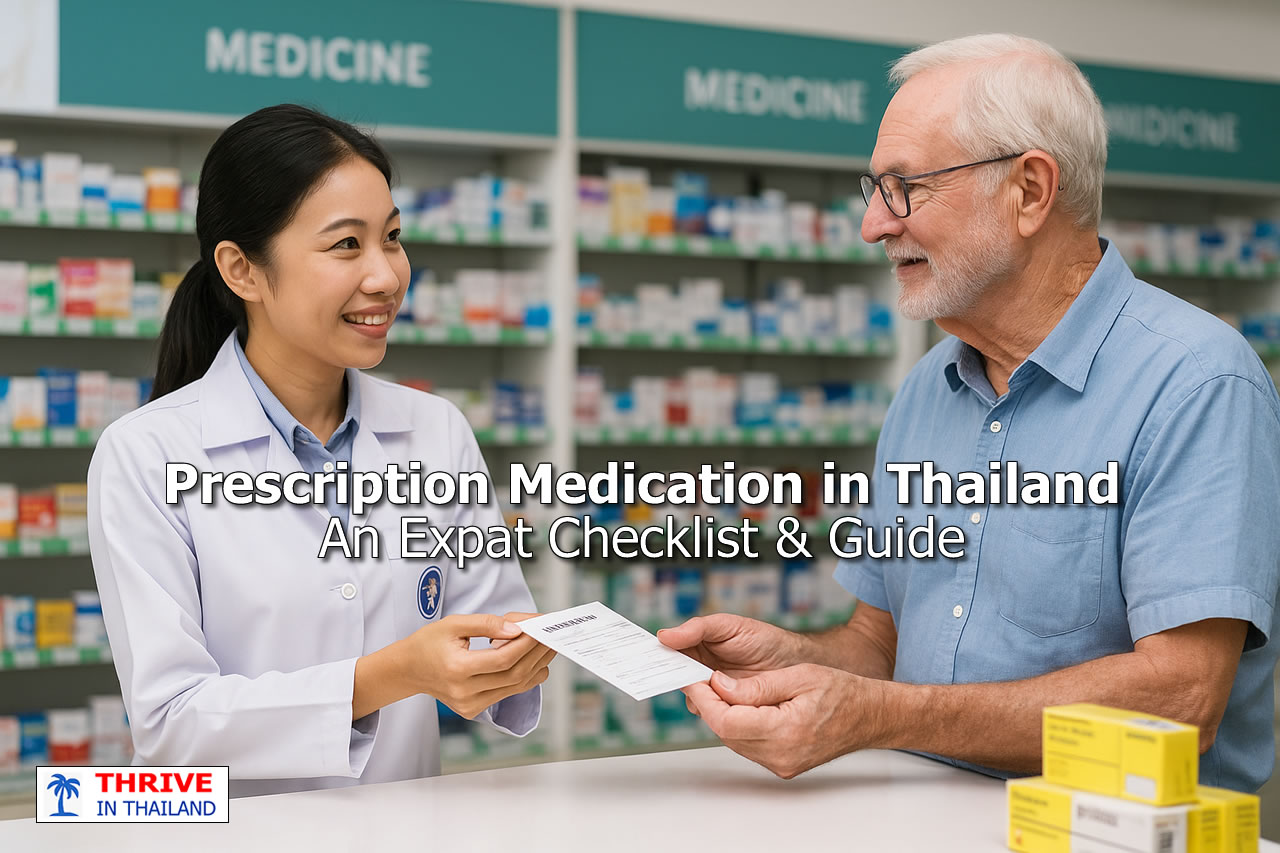
Thailand is a great place to live—but if you rely on prescription medication, things can get confusing fast. Some drugs you’re used to picking up at home might be sold over the counter here, while others are restricted or completely unavailable. Labels are in Thai, brand names are different, and not every pharmacist speaks English.
Whether you’re managing a chronic condition, need regular refills, or just want to bring your own meds from abroad, it’s important to understand how things work before you run out—or run into trouble.
This guide covers everything you need to know about prescription medication in Thailand as an expat. From what’s easy to buy and what’s off-limits, to local pharmacies, import rules, and cost comparisons, it’s all here in plain English.
What You Can (and Can’t) Get Without a Prescription
One of the first things new expats notice in Thailand is how easy it is to walk into a pharmacy and walk out with medication—sometimes even strong stuff—without showing a prescription. But this convenience has limits, and those limits can get you into serious trouble if you’re not careful.
Common Medications Available Over the Counter
In Thailand, you can usually buy the following without a prescription:
- Antibiotics like amoxicillin or ciprofloxacin (although they shouldn’t be taken without proper diagnosis)
- Painkillers such as ibuprofen and paracetamol
- Allergy meds like cetirizine and loratadine
- Cold and flu tablets, cough syrups, and lozenges
- Topical creams, antifungals, antiseptics, and ointments
- Birth control pills and emergency contraception
Local pharmacists are often knowledgeable and helpful—but their advice doesn’t replace a doctor’s diagnosis, especially for recurring or serious symptoms.
Medications That Require a Prescription (or Are Hard to Get)
Thailand does have strict controls on certain types of drugs. Some are only available at hospitals or require a Thai doctor’s prescription. Others are considered controlled substances and may not be available at all without special government approval.
Here are examples of medications that usually require a prescription or are hard to access:
- ADHD medication (e.g. Ritalin, Adderall): tightly regulated, almost impossible to get legally
- Strong painkillers (e.g. opioids like oxycodone or morphine): available only through hospitals with strict controls
- Psychiatric meds (e.g. certain antidepressants, benzodiazepines like Xanax or Valium): can be prescribed, but require proper documentation and local evaluation
- Hormonal treatments, including testosterone: require a prescription and possibly blood tests
- Sleeping pills beyond mild types: usually require a hospital prescription
Carrying or importing restricted meds without proper documents can lead to legal trouble—even if you have a valid foreign prescription.
📌 Tip: Always check the Thai name of the active ingredient and not just your home brand name—many medications are sold under different labels here.
Bringing Medication into Thailand
If you rely on regular medication, bringing your own supply into Thailand makes sense—especially if your meds are hard to find locally or if you’re only visiting for a few months. But Thailand doesn’t take a “don’t ask, don’t tell” approach when it comes to pharmaceuticals. Some substances are fine in small amounts for personal use, while others fall under strict Thai drug laws that could land you in legal trouble.
This section walks you through everything you need to know—so you don’t get stopped at customs or lose your medication at the airport.
The Basics: What You Can Bring (and Under What Conditions)
Thailand allows travelers and expats to bring in prescription and non-prescription medication for personal use, but there are clear guidelines:
- Quantity: You can bring up to a 30-day supply per medication, as long as it’s clearly for personal use.
- Packaging: Medications should be in original blister packs or bottles with labels showing your name and the drug name.
- Documentation: Carry a copy of your prescription and a doctor’s letter describing your condition and the medication prescribed. Ideally, this should be in English and list:
- Your full name
- The name of the medication (both brand and generic name)
- The dosage and frequency
- The medical condition it’s treating
📌 Even if customs doesn’t check, having this documentation can help if your luggage is inspected, if you’re questioned at the airport, or if you need to replace the meds later at a Thai hospital.
Controlled or Restricted Medications: What to Watch Out For
Thailand has a strict classification system for drugs, and some medications that are perfectly legal in your home country are banned or tightly controlled here.
Common examples that raise red flags:
- ADHD medication like Adderall (amphetamine) or Ritalin (methylphenidate)
- Opioid painkillers such as oxycodone, codeine, or morphine
- Benzodiazepines like diazepam (Valium), alprazolam (Xanax), lorazepam (Ativan)
- Certain antidepressants or sleeping pills with psychoactive effects
- Testosterone and other anabolic hormones
If you’re bringing any of the above—even in small amounts—you must:
- Apply for permission from the Thai Food and Drug Administration (FDA) before entering Thailand
- Submit a formal request with details including:
- Medical certificate from your doctor
- Passport information
- Travel details
- Exact medication names and amounts
The process can take 2–3 weeks, and approval is not guaranteed.
📌 The official form and contact details are available here:
Thai FDA Bureau of Drug Control – Import for Personal Use
https://www.fda.moph.go.th (site in Thai with limited English support—use browser translation tools)

What Happens If You Don’t Follow the Rules?
Carrying unapproved controlled substances—even with a legitimate prescription from abroad—can have serious consequences, including:
- Confiscation of your meds
- Detention or questioning at the airport
- Fines or even criminal charges, in extreme cases
Thai authorities treat drug offenses very seriously. The key distinction is intent: bringing medication for personal use is fine if documented properly. But undeclared or suspicious quantities—especially of controlled substances—are treated as import violations or worse.
Packing Tips: How to Prepare Before Your Trip
To avoid hassle or delays:
- Keep all medication in carry-on luggage—don’t risk lost checked bags
- Bring printed prescriptions and doctor’s letters (plus a digital copy on your phone)
- Label everything clearly—never repackage pills into unmarked containers
- Know the generic names of your medications in case you need local refills
If You’re Moving to Thailand Long-Term
If you’re coming to Thailand for an extended stay, it’s wise to:
- Bring 2–3 months’ supply to give yourself time to find a Thai doctor and arrange refills locally
- Set up an appointment with a private hospital or specialist soon after arrival to discuss continuity of care
- Consider translating your medical records (or bringing a summary) if you’re under treatment for a chronic condition
📌 Some long-term expats also keep their meds restocked via regular visits home, or by having a trusted person bring them during visits—with a signed letter from a doctor.
Before You Travel – Medication Prep Checklist (Overview)
| Task | Details |
|---|---|
| Check Thai FDA restrictions | Look up your medications to ensure they are not classified as controlled or prohibited in Thailand. |
| Apply for FDA approval if needed | If you’re carrying ADHD meds, opioids, or other controlled drugs, seek pre-approval from the Thai FDA before traveling. |
| Get a prescription letter |
The letter should include: – Your full name and condition – Medication name (brand and generic) – Dosage and usage instructions |
| Translate if necessary | If your documents are not in English, bring a translated version to avoid issues at customs or hospitals. |
| Use original packaging | Keep all medications in labeled blister packs or pharmacy containers—avoid unlabeled bottles or loose pills. |
| Print and back up documents | Bring printed copies of prescriptions and doctor’s notes—and store backups on your phone or cloud storage. |
✅ Download the full printable checklist: Everything you need to bring prescription medication into Thailand safely and legally.
Getting a Prescription Locally in Thailand
If you run out of your medication while living in Thailand, don’t panic—prescriptions are easy to obtain in most cases, as long as your condition and treatment are straightforward. The key is knowing where to go, what to bring, and how to navigate the local system without unnecessary stress.
Here’s what you need to know:
Where to Get a Prescription
- Private hospitals (like Bangkok Hospital, Bumrungrad, or Bangkok Chiang Mai Hospital) are the most reliable choice. You’ll be seen quickly, and most doctors speak English.
- Clinics attached to pharmacies can also issue prescriptions for common conditions, especially if you already know what medication you need.
- Public hospitals are affordable, but wait times are longer and English is less commonly spoken.
📌 Tip: If you’re on long-term medication, establish care with a private hospital doctor early—this builds consistency and trust for future refills.
What You’ll Need
- A copy of your previous prescription or doctor’s letter (if available)
- Your passport (for ID and patient registration)
- A list of your medications, including the generic names, not just brand names
Prescriptions Are Often Issued on the Spot
Unlike in some countries where you need a referral or multi-step approval, Thai doctors generally write prescriptions during your visit. In many cases, you can buy the medication directly from the hospital’s in-house pharmacy right after your appointment.
Exceptions & Restrictions
- Some medications (like opioids, benzodiazepines, and ADHD meds) are only available at hospitals—and may still be restricted.
- You may be asked for blood work or local diagnostics before receiving certain high-risk meds (like hormones or psychiatric drugs).
- Refills are not always automatic. Thai doctors may want to see you before renewing anything beyond 30 days.
Cost and Insurance Coverage
Thailand is known for affordable healthcare—but medication costs can vary widely depending on where you buy, what you need, and whether your health insurance covers prescriptions.
Here’s what to expect when it comes to pricing and payment.
Medication Costs in Thailand
- Generic medications are widely available and typically cheap—often far more affordable than in Western countries.
- Imported brand-name drugs can be surprisingly expensive, especially at private hospitals.
- Hospital pharmacies are convenient but usually pricier than local drugstores for the same medication.
- Chain pharmacies (like Boots or Watsons) offer reasonable prices and English support, while independent shops may offer the best deals on generics.
📌 If you’re staying long-term, it’s worth comparing prices between hospital pharmacies and local shops—especially for recurring meds. For a broader look at how medication fits into everyday expenses, check out my full Cost of Living in Thailand guide.
Does Insurance Cover Prescription Medication?
That depends on your policy. Here’s the general breakdown:
- Local Thai health insurance plans often exclude outpatient prescriptions or offer minimal coverage.
- International expat insurance may cover prescriptions—but usually only if the meds are prescribed during a covered outpatient visit.
- Travel insurance rarely covers routine medication refills or long-term treatment.
✅ Always check the fine print. If prescriptions are covered, make sure you:
- Request an itemized receipt
- Get the doctor’s diagnosis code (ICD) if required by your insurer
- Submit your claim within the allowed timeframe
Prescription coverage isn’t always included, and policies vary widely. Compare trusted plans and learn what to look for in my full Thailand Health Insurance Guide.
Special Cases and Warnings
Thailand’s relaxed approach to some medications can give a false sense of security—but make no mistake: certain drugs are heavily restricted and can get you into legal trouble if you’re not careful. Here’s what every expat and long-stay visitor needs to understand.
Medications That Are Strictly Controlled or Banned
These medications are not widely available—or in some cases, illegal to possess without special approval:
- ADHD medications like Adderall (amphetamine) or Ritalin (methylphenidate) – nearly impossible to get legally in Thailand
- Opioid painkillers (oxycodone, hydrocodone, morphine) – only prescribed in hospitals under strict protocols
- Benzodiazepines like Xanax (alprazolam), Ativan (lorazepam), and Valium (diazepam) – available, but monitored
- Certain antidepressants and sleeping pills – require local evaluation and may not be stocked everywhere
- Hormonal treatments (e.g., testosterone therapy) – may require blood work and specialist oversight
📌 Don’t assume availability just because you’ve seen it sold back home—Thailand has its own classification system.
Never Do the Following:
- Don’t bring in restricted medication without Thai FDA approval
- Don’t assume that a prescription from your home country will be honored here
- Don’t repackage pills in unlabeled containers—it looks suspicious
- Don’t try to buy restricted meds on the street or from unlicensed sources
Legal Risks Are Real
Possession of certain medications without the proper paperwork can lead to:
- Fines
- Confiscation
- Entry denial
- In severe cases, criminal charges
📌 Thailand’s drug laws are strict and enforced—especially at airports. But if you’ve followed the rules and have documentation, you’re unlikely to have issues.
FAQ: Prescription Medication in Thailand
Can I buy the same brand-name medication I use at home in Thailand?
Not always. Many medications are sold under different brand names—or only as generics. Bring the generic name (active ingredient) with you to help Thai pharmacists find the right match.
Can I mail prescription medication to myself in Thailand?
It’s risky. Thai customs may seize mailed medication, especially if it’s a controlled substance or lacks proper documentation. It’s safer to bring your medication in person or refill it locally with a doctor’s prescription.
What if I lose my medication or run out unexpectedly?
Go to a private hospital or licensed clinic. Bring your old prescription, a list of medications, or at least the generic names. Doctors in Thailand can usually prescribe common meds quickly—assuming they’re legally available.
Is medical marijuana legal for expats in Thailand?
Medical cannabis is legal for expats in Thailand, but only with a prescription from a Thai-licensed doctor and access through authorized clinics. Expats cannot bring cannabis or cannabis-based products into Thailand—even with a foreign medical prescription.
Can I buy antibiotics without a prescription?
Yes, in most cases. Many Thai pharmacies will sell common antibiotics like amoxicillin without a prescription—but self-medicating is risky. It’s best to speak with a doctor before starting any new course.
Conclusion
Managing prescription medication in Thailand doesn’t have to be complicated—as long as you understand the rules, prepare properly, and know where to go for help. Whether you’re bringing meds from home, buying them locally, or navigating a long-term routine, this guide gives you the tools to do it safely and confidently.
If you’ve had experience bringing medication into Thailand or getting it locally, feel free to share it in the comments—it could really help fellow expats navigating the same path.

